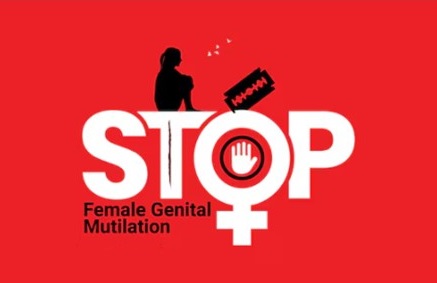By: Foluke Akinwalere. Freelance Health Writer. Medical review and editorial support provided by the DLHA Team

Zero tolerance to Female Genital Mutilation. image credit from Freepik
Education and media are powerful tools in the global fight against female genital mutilation. Media campaigns and documentaries have played a crucial role in raising awareness about the dangers of FGM, both within affected communities and on a global scale. For example, documentaries like the “The Cut” have brought the harsh realities of FGM to a wider audience, highlighting the physical and emotional scars it leaves behind. These media efforts serve to inform, educate, and mobilise action against FGM by showing the personal stories behind the statistics.
Social media has also become a vital platform for amplifying voices against FGM Campaigns such as #EndFGM has gained traction which allows survivors, activists, and organisations to share their experiences, spread information, and rally support from around the world. The viral nature of social media helps reach younger audiences and foster a global community united against FGM.
Education is a cornerstone of prevention efforts. School-based programs that address FGM and gender equality are essential in changing perceptions among the younger generation. These programs not only educate students about the dangers of FGM but also promote values of respect, bodily autonomy, and gender equality. By integrating discussions of FGM into broader sexual and reproductive health education, students learn to understand FGM as a violation of human rights, rather than a cultural norm.
Educational initiatives are also aimed at teachers, parents, and community leaders, equipping them with the knowledge and tools to prevent FGM and support affected individuals. These programs help to break the cycle of FGM by fostering an environment where girls can grow up free from the fear of being cut.
Personal testimonies from FGM survivors are powerful narratives that drive change. These stories humanise the issue, providing a face and voice to the statistics. Survivors who advocate against FGM often share their experiences through media outlets, community events, and online platforms, using their stories to raise awareness and inspire others to join the fight. For instance, activists like Awa Daissy, Waris Dirie, Purity Soinato Oiyie, and Ifrah Ahmed have used their experiences to lead global campaigns against FGM, significantly influencing pubic perception and policy.
Media representation also plays a critical role in shifting public perceptions. By portraying FGM as a critical human rights issue rather than a cultural norm, media can help reshape societal attitudes. Increased coverage of FGM in news outlets, films, and social media contributes to a broader understanding of the issue, encouraging more people to take action and support efforts to end the practice.
To fully eradicate FGM, sustained global and local collaboration is essential. Governments, NGOs, and communities must continue to work together to implement and enforce anti-FGM laws, while also addressing the cultural and social factors that perpetuate the practice. Education and advocacy must be ongoing, ensuring that future generations understand the dangers of FGM and the importance of gender equality. Legal efforts need to be strengthened and resources must be allocated to support the enforcement of laws and the provision of services for survivors.
The global, national and local community efforts to end Female Genital Mutilation (FGM) have made significant strides, but challenges remain. International organisations, national governments, and grassroots movements have all played crucial roles in combating FGM through the use of legal frameworks, educational initiatives, and community-based interventions. Media and education have been pivotal in raising awareness, and shifting public perceptions, while survivors’ testimonies have brought the issue to the forefront of global consciousness. Despite these efforts, deeply rooted cultural practices, logistical barriers, and enforcement challenges continue to hinder progress. A Call to Action by the collective forces of all stakeholders in the matter remains of importnce:
Every action counts in the global effort to protect the rights and health of women and girls.
← National and Local Community Efforts to End FGM
References
1. UNICEF, What is female genital mutilation? [Internet, n.d.] Accessed, August 10, 2024] Available from here.
2. World Health Organisation. Female genital mutilation. [Internet]. 5 February 2024, [Accessed August 10, 2024] Available from here.
3. United Nations Population Fund (UNFPA) Female Genital Mutilation Among Cross Border Communities [Internet] 2022. Accessed August 13, 2024. Available here,
4. Hannelore V. B., The ‘Loita Rite of Passage: An alternative to the alternative rite of passage? SSM - Qualitative Research in Health, Volume 1, 2021, 100016, doi: 10.1016/j.ssmqr.2021.100016. Available here.
Related
Social Factors Shaping African Women's Health
Gambia upholds ban on FGM, boosts women’s health and rights
Exploring the Cultural, Social, and Religious Basis for FGM in Africa
Published: September 19, 2024.
© 2024. Datelinehealth Africa Inc. All rights reserved.
Permission is given to copy, use and share content freely for non-commercial purposes without alteration or modification and subject to source attribution.
DATELINEHEALTH AFRICA INC., is a digital publisher for informational and educational purposes and does not offer personal medical care and advice. If you have a medical problem needing routine or emergency attention, call your doctor or local emergency services immediately, or visit the nearest emergency room or the nearest hospital. You should consult your professional healthcare provider before starting any nutrition, diet, exercise, fitness, medical or wellness program mentioned or referenced in the DatelinehealthAfrica website. Click here for more disclaimer notice.